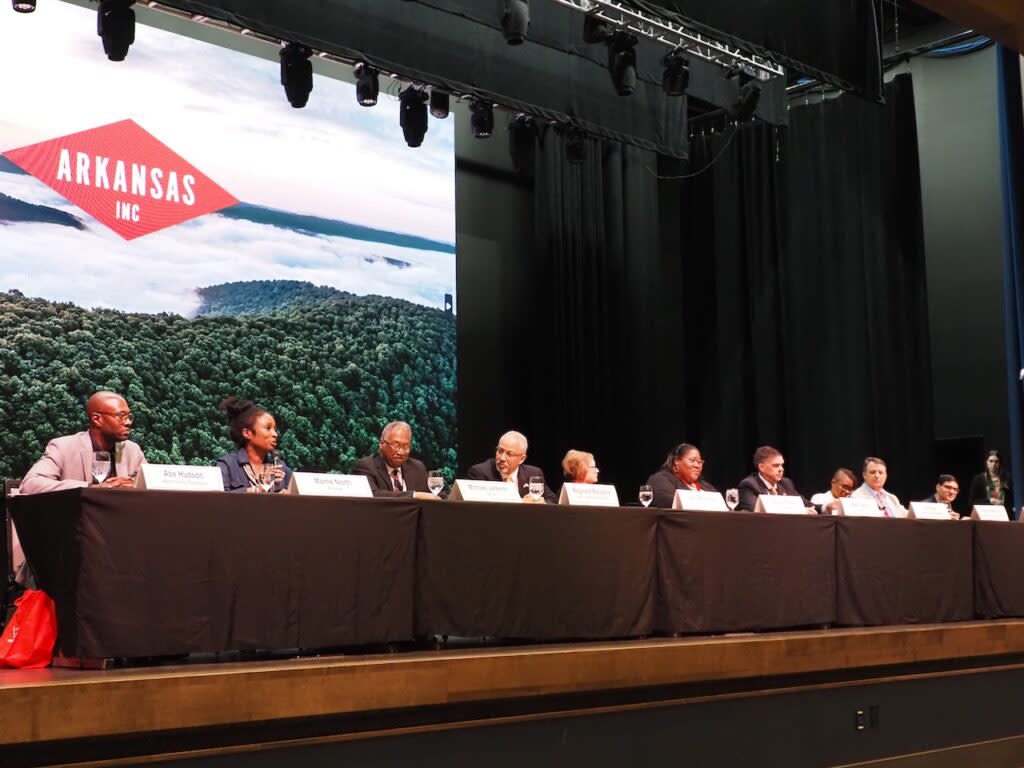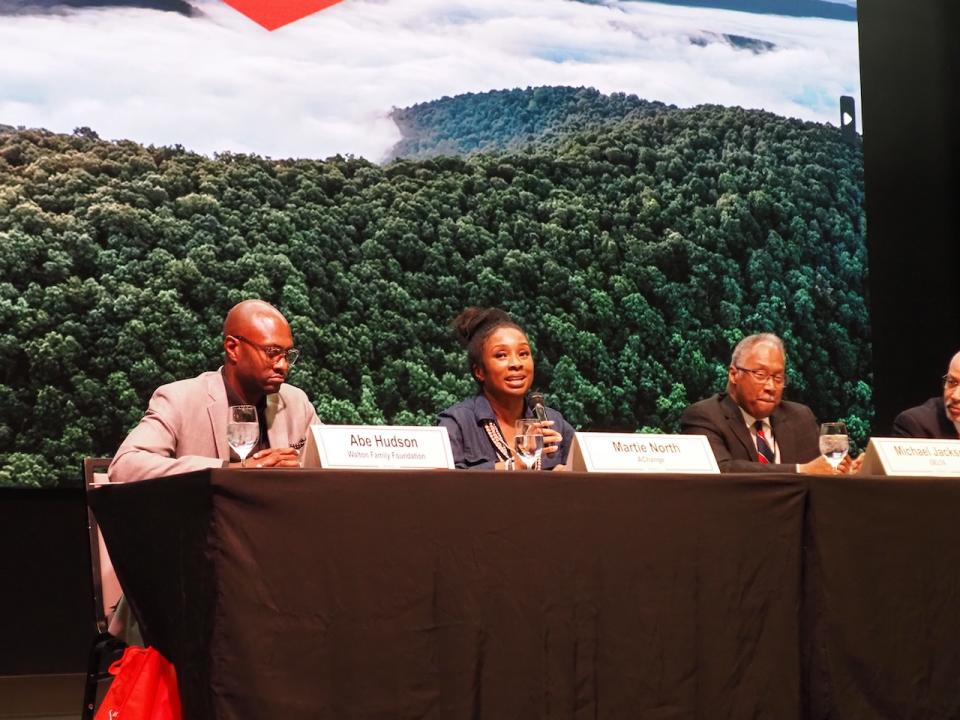Experts identify affordable housing barriers, opportunities for rural Arkansas

A panel of housing experts answer questions during the 2024 Rural Development Conference on May 21, 2024 in Hot Springs. (Mary Hennigan/Arkansas Advocate)
By definition, housing should not exceed 30% of a person’s monthly income to be considered affordable. But with rising construction costs, capacity issues and an overall lack of project funding, options in rural Arkansas can be limited.
Ten housing experts from the private and public sectors joined a panel Tuesday afternoon at the 2024 Rural Development Conference in Hot Springs to discuss affordable housing in rural Arkansas. Speaking to an audience of leaders from across the state, panelists expounded on barriers that exist in today’s market and brainstormed ideas to combat the ongoing affordable housing crisis.
“People are starving for affordable housing,” said Mark Conine, president of the Arkansas Development Finance Authority.
The Development Finance Authority works to promote growth in the state by providing financing for affordable housing, capital improvements for local governments and other projects.
Prioritizing affordable housing, while also getting enough people committed to the issue, is crucial for development in Arkansas and all across the country, Conine said.
Martie North, president of the nonprofit ACHANGE, said Arkansas’ small population is both an advantage and a disadvantage for housing projects in the state. While having 3 million residents may result in smaller federal funding allocations, piloting a few innovative ideas could make Arkansas a leader in housing solutions, North said.
Incorporating housing stock that spans a variety of price points and sizes within one community is one way to provide accessible options, said Jill Floyd, state director for the U.S. Department of Agriculture’s Rural Development office.
“[A community where] you can come in as a new young homebuyer, go all the way up and then when you’re ready to downsize you come all the way back down,” Floyd said. “Everything has a consistent community, so you don’t have to move.”
One challenge with large-scale projects, Floyd said, is that a developer can’t easily construct houses across the state when every municipality creates its own building code.
Zoning laws pose a different, additional hurdle, said Abe Hudson with the Walton Family Foundation. Rural communities in the South need to do a better job of long-term planning so construction companies can work quickly and easily, rather than being bogged down with rezoning delays, he said.
“That’s so critically important because it puts us in a position that we can look out further and make real plans for a community that can be able to sustain itself versus allowing people to be in communities and decide to do whatever it is that they want to,” Hudson said.
Opportunity ahead
Panelists seemed to value involvement from differing levels of the community, companies, philanthropic organizations, government and more. Success comes much faster when several groups buy into a plan, Conine said.
“It takes a commitment from everyone,” he said. “If you want to see a successful project … it takes a commitment level from that local area for the project, and then [other] people get on board so there’s all types of funding that comes together.”
Small towns developing housing at the same time could increase the scale of a project, which would make it more attractive to potential investors, said Michael Jackson, CEO of Delta Community Development and Law Center.
“Just imagine if small towns in southeast Arkansas that are within five to 15 miles of each other decided they wanted to improve housing so much that when employers think about a place to go, they know that place, those nearby small towns are going to offer good quality housing and hopefully, good quality education to the children,” Jackson said, making a reference to similar collaboration in Northwest Arkansas.

Panelists also recommended communities look into developing a local land bank to obtain parcels from people who want to donate.
On the funding side, Hudson said the Walton Family Foundation was looking into investing in more infrastructure projects in Northwest Arkansas and the Delta in the southeast part of the state.
“Building a vibrant and equitable Delta for the long haul won’t happen by going at it alone,” he said.
North proposed state officials should allocate money to the Arkansas Housing Trust Fund, which she said has not been funded since its inception in 2009. Further, she said projects that have private and public partnerships can mitigate risks.
“If we want to continue to grow our state, especially the areas between Northwest Arkansas and any other point in the state … we’ve got to work collaboratively and I think we have the ability to do so if we’re willing to do so,” North said.
GET THE MORNING HEADLINES DELIVERED TO YOUR INBOX
The post Experts identify affordable housing barriers, opportunities for rural Arkansas appeared first on Arkansas Advocate.

